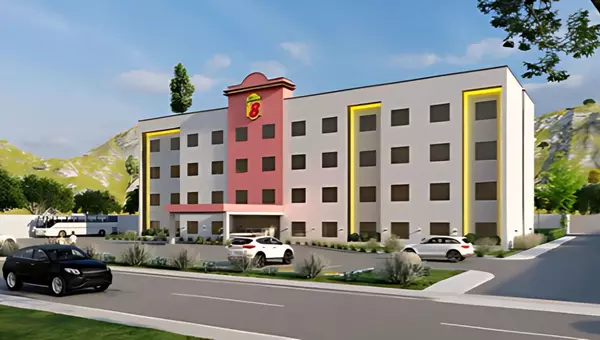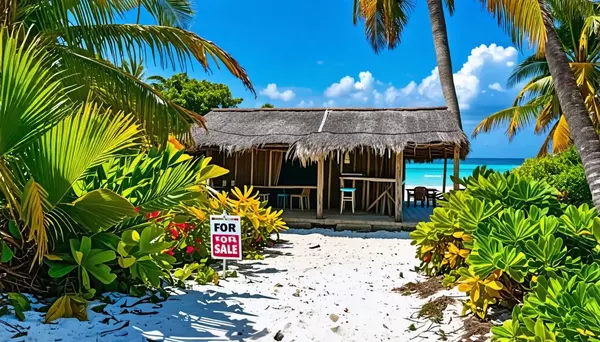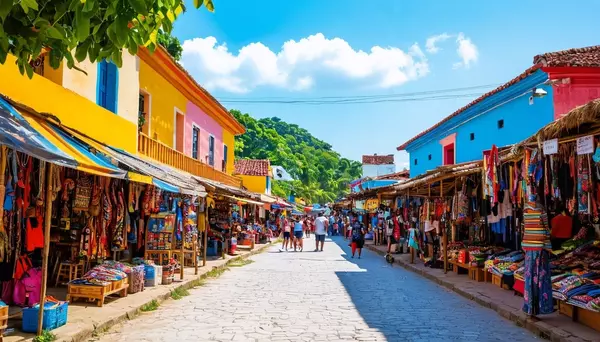Common mistakes to avoid when buying property in The Dominican Republic

Buying property in the Dominican Republic can be tricky. 2 Many people make costly mistakes due to unfamiliarity with local laws and customs. 1 Did you know that resolving property disputes in the Dominican Republic often takes years? 3 This article will help you avoid common pitfalls when purchasing real estate in this Caribbean paradise.
Read on to protect your investment.
Key Takeaways
- Checking a property's legal status at the Title Registry Office is crucial to avoid fraud and ensure a smooth purchase in the Dominican Republic.
- Understanding "Deslindado" (legally defined boundaries) and "Posesión" (squatter's rights) is vital to prevent ownership disputes and financial losses.
- Buyers should be aware of high-risk zones prone to natural disasters and consider "Comunidad de Bienes" (joint property ownership) arrangements in condos or complexes.
- The Dominican Republic's real estate market offers tax perks for foreign buyers and shows promising growth, with Puerto Plata being a hotspot for investors.
- Hiring a local lawyer, conducting thorough legal checks, and using escrow services are essential steps to prevent common pitfalls when buying property in the Dominican Republic.
Failing to Check the Legal Status of the Property
Verifying a property's legal status is crucial for foreign buyers in the Dominican Republic. The Title Registry Office or Real Estate Jurisdiction platform holds vital information about property ownership.
Smart investors check for opposition, mortgage arrears, seizures, and warning notes before making a purchase. This step helps avoid fraudulent activities and ensures a smooth transaction. 1
Experts recommend hiring a lawyer for thorough due diligence. A legal professional can spot potential issues that may not be apparent to the untrained eye. They'll scrutinize the title deed, examine any liens, and verify the seller's right to dispose of the property.
This extra layer of protection safeguards buyers from costly mistakes and legal battles down the road. 2
Overlooking the Concept of "Deslindado"
Understanding "Deslindado" is crucial for property buyers in the Dominican Republic. This term refers to land parcels without legally defined boundaries. Many investors overlook this concept, leading to potential disputes and legal issues.
A property without clear boundaries can cause conflicts with neighbors and complicate future sales. Local real estate agents often stress the importance of verifying a property's "Deslindado" status before purchase. 3
Buying 'Deslindado' property is like walking into a minefield blindfolded. - Dominican Real Estate Expert
Thorough due diligence is essential to avoid "Deslindado" related problems. Buyers should conduct a title search and physical inspection of the property. Consulting with a local attorney can help navigate potential boundary disputes.
The process of legally defining property boundaries can be time-consuming and expensive. Investors must factor these potential costs into their budget when considering "Deslindado" properties.
Failure to address this issue can significantly impact property value and investment returns. 4
Ignoring the Risks Related to “Posesión”
Moving from "Deslindado," we encounter another critical aspect of Dominican property law: "Posesión." This concept poses significant risks for property buyers. "Posesión" refers to squatter's rights, allowing individuals to gain legal rights by occupying land.
Ignoring these risks can lead to complicated ownership disputes and financial losses. 5
Foreign investors must grasp the nuances of "Posesión" before purchasing real estate in the Dominican Republic. Local experts and thorough title searches are essential to uncover potential claims on the property.
Proper due diligence helps avoid conflicts with long-term occupants who may have acquired legal rights through "Posesión." This step is crucial for safeguarding investments and ensuring smooth property transactions in popular areas like Punta Cana or Cap Cana. 6
Buying Unallocated Land
Purchasing unallocated land in the Dominican Republic can lead to serious legal troubles. This type of property often belongs to the government or is reserved for environmental protection.
Buyers must verify land allocation status and consult local authorities before making any commitments.
Avoiding unallocated land safeguards investors from potential disputes and financial losses. 1 Smart buyers focus on properties with clear titles and proper documentation. These precautions ensure a smooth transaction and secure ownership.
The next crucial aspect to consider is the risk of "Posesión" or informal land possession. 3
Neglecting "Conflicto de Terrenos" or Land Disputes
Land disputes, or "Conflicto de Terrenos," pose significant risks for property buyers in the Dominican Republic. These conflicts often stem from historical issues of overlapping land titles, creating a complex web of ownership claims.
Resolving such disputes can be a lengthy process, requiring patience and legal expertise. 3 Investors must conduct thorough due diligence before purchasing any property to avoid getting entangled in these contentious situations.
Inherited properties present unique challenges in the Dominican real estate market. Unresolved family disputes or undisclosed heirs can complicate ownership rights, leading to potential legal battles.
To navigate these issues, consulting a local attorney well-versed in Dominican inheritance laws is crucial. This step helps protect property investments and ensures a smoother transaction process.
Buyers should also be prepared for the possibility of lengthy negotiations and legal proceedings if a land dispute arises. 1
Overlooking "Zonas de Alto Riesgo" or High-Risk Zones
Ignoring high-risk zones in the Dominican Republic can lead to costly mistakes for property buyers. These areas face threats from natural disasters like floods, landslides, and hurricanes. 3 Thorough research is crucial before investing in such locations. Property damage and insurance challenges often plague homes in these zones, making them risky investments.
Smart buyers consult local experts and study environmental history before purchasing. This due diligence helps avoid potential financial losses and safety risks associated with high-risk properties. 7 Understanding the local climate patterns and disaster preparedness measures can make a big difference in property selection and long-term value.
Not Considering "Comunidad de Bienes" or Joint Property Ownership
Buying property in the Dominican Republic often involves "Comunidad de Bienes" arrangements, especially in condos or residential complexes. This joint ownership model means shared responsibility for common areas and collective decision-making processes.
Investors must grasp the financial obligations tied to these arrangements. Understanding the nuances of "Comunidad de Bienes" helps avoid unexpected costs and disputes with co-owners. 3
Savvy real estate investors dig into the details of joint property ownership before signing contracts. They examine homeowners' association fees, maintenance schedules, and voting rights within the community.
Smart buyers also consult with local real estate agencies and financial advisors to gauge the long-term implications of shared ownership on their investment goals and rental income potential. 8
Supplementary Insights on Property Purchase
Buying property in the Dominican Republic involves more than just finding a dream home. Smart buyers dig deeper into local real estate practices and regulations. These extra insights can make or break a successful purchase.
Importance of Cadastral Appraisal ("Avalúo Catastral")
The "Avalúo Catastral" plays a crucial role in property ownership in the Dominican Republic. This official government valuation serves as the basis for property taxes, which have seen significant increases recently.
Property buyers must grasp the implications of this appraisal to avoid underestimating ongoing costs associated with their real estate investment. 3
Understanding the cadastral appraisal helps investors make informed decisions about property values and potential tax liabilities. It's essential to factor in these costs when calculating the total investment and potential returns on Dominican real estate.
The next section explores the concept of "Derecho de Paso" or Right of Way, another important aspect of property ownership in the country. 9
Understanding "Derecho de Paso" or Right of Way
Derecho de Paso" plays a crucial role in Dominican property law. This right of way grants access over one property to reach another or a public area. 3 Property buyers must investigate thoroughly, including physical inspections, to uncover any existing rights of way.
Such easements can impact land use and value significantly.
Local attorneys prove invaluable in uncovering unrecorded rights of way. These legal experts can review property documents, conduct searches, and provide insights on potential issues. 10 Their knowledge helps buyers avoid surprises and make informed decisions about their real estate investments in the Dominican Republic.
Significance of "Zonas Protegidas" or Protected Zones
While right of way concerns access to property, protected zones focus on preservation. The Dominican Republic has designated areas as "Zonas Protegidas" to safeguard natural and cultural heritage.
These zones play a crucial role in maintaining biodiversity and historical sites. 3
Buyers must research thoroughly before purchasing property in or near these areas. Local environmental agencies and historical societies offer valuable insights. Strict regulations often apply, limiting development and land use.
A local attorney can guide investors through compliance issues. Understanding these zones helps prevent costly mistakes and supports sustainable tourism growth. 11
Analyzing the Real Estate Market Before Buying
Analyzing the real estate market in the Dominican Republic demands a keen eye for trends and growth potential. Puerto Plata stands out as a hotspot for investors, boasting promising market values and rental income opportunities.
The country's robust GDP growth rate of around 5% signals a thriving economy, making it an attractive destination for property buyers. Smart investors dig into local economic indicators, property prices, and tourism statistics to gauge future returns. 12
Tax perks sweeten the deal for foreign buyers in the Dominican Republic. The government offers exemptions on property transfer and capital gains taxes, boosting the appeal of vacation homes and commercial properties alike.
These incentives, coupled with the country's steady economic growth, create a favorable climate for real estate investment. Savvy buyers also consider factors like foreign exchange rates, interest rates, and inflation to make informed decisions.
The next crucial step involves understanding the legal intricacies of property ownership in the country. 13
Steps to Prevent Common Pitfalls
Avoiding common pitfalls when buying property in the Dominican Republic requires careful planning and due diligence. Here are essential steps to safeguard your investment and ensure a smooth transaction:
- Conduct thorough legal checks: Verify the property's legal status, including title deeds and building approvals. Ensure the seller has clear ownership rights and authority to sell. 1
- Hire a reputable lawyer: Engage a local attorney experienced in Dominican real estate law to guide you through the process and protect your interests.
- Investigate land status: Confirm if the property is "deslindado" (surveyed and registered) to avoid future boundary disputes or ownership issues.
- Research zoning regulations: Check local zoning laws and building codes to understand permitted uses and potential restrictions on the property.
- Assess natural hazards: Evaluate the property's location for risks like flooding, earthquakes, or hurricanes. Consider insurance options for natural calamities.
- Perform a cadastral appraisal: Obtain an official valuation of the property to ensure fair pricing and accurate tax assessments.
- Examine joint ownership implications: If buying with a partner, understand the "comunidad de bienes" concept and its legal implications for property ownership.
- Review development plans: Research upcoming infrastructure projects or tourism developments that may impact property value or quality of life. 13
- Secure proper financing: Explore mortgage options with local banks and understand interest rates, terms, and foreign exchange fees.
- Use escrow services: Protect your funds by using an escrow account for property transactions, ensuring secure money transfers.
- Consider property management: If planning to rent the property, research local property management companies for vacation rentals or long-term leases.
- Understand tax obligations: Familiarize yourself with property taxes, income taxes on rental income, and any other relevant tax payments.
- Inspect thoroughly: Conduct a comprehensive property inspection to identify any structural issues, needed repairs, or hidden problems.
The next section will analyze the current real estate market trends in the Dominican Republic to provide context for your investment decision.
Conclusion
Buying property in the Dominican Republic requires careful navigation of unique challenges. Armed with knowledge about legal statuses, land disputes, and ownership rights, you'll sidestep common pitfalls.
Understanding concepts like "deslindado" and "posesión" safeguards your investment. Thorough market analysis and professional guidance prove invaluable in this process. By following these steps, you'll secure your dream property with confidence.
Your Caribbean real estate journey starts now – embrace it wisely and reap the rewards of your investment.
To gain deeper insights into making an informed decision, make sure to read our guide on how to analyze the real estate market before buying property in the Dominican Republic.
FAQs
1. What's the deal with property titles in the Dominican Republic?
Property titles can be tricky. Make sure you're dealing with the real landowner. Some folks try to sell land they don't own. Always check the property title's history. Get a notary to verify everything. It's worth the extra step.
2. How does the tourism industry affect the property market?
Tourism is huge here. It drives economic activity and boosts the property market. High-end areas like Playa Nueva Romana are hot spots. But be careful - tourism trends can change. Don't assume today's hotspot will always be popular with tourists and renters.
3. What's the scoop on financing and mortgages?
Financing can be tough. Many buyers use cash or bank transfers. Mortgages exist but they're not as common as in other countries. Watch out for high inflation rates. They can affect your investment. Always have a solid finance plan before buying.
4. Are there any tricks to avoid when renting out my property?
Renting, especially through Airbnb or condo-hotels, can be profitable. But know the rules. Some areas have restrictions on short-term rentals. Make sure you understand local laws. Keep good records of all receipts. You'll need them for taxes.
5. How do I know if I'm getting a fair price?
Valuations can be tricky here. There's no standard multiple listing service. Prices can vary wildly. Do your homework on real estate trends. Don't be afraid to make a counteroffer. Get several opinions before you buy.
6. What should I know about taxes and legal stuff?
The tax system is different here. Property can be taxed in ways you might not expect. Land leases work differently too. Always use escrow accounts for big transactions. Never hand over cash without proper documentation. Get expert advice on disposition of property. It'll save you headaches later.
References
- ^ https://www.knightsbridgefx.com/what-are-the-pitfalls-of-buying-property-in-the-dominican-republic/ (2022-12-23)
- ^ https://cofresihills.com/buying-property-in-the-dominican-republic/
- ^ https://thelatinvestor.com/blogs/news/dominican-property-pitfalls (2023-12-16)
- ^ https://m.facebook.com/groups/everythingsosua/posts/7537932586249955/ (2024-03-23)
- ^ https://www.oecd.org/content/dam/oecd/en/publications/reports/2023/09/digital-government-review-of-latin-america-and-the-caribbean_75a4be05/29f32e64-en.pdf
- ^ https://www.bakermckenzie.com/-/media/files/people/alturk-mohammad/ar_global_franchisinglatinamericacaribbean_nov2016.pdf?rev=47bc44761063413889709784f69b92d1&sc_lang=en&hash=DE71F3A941153DE4ED21D9B52D43B039
- ^ https://www.adaptation-fund.org/wp-content/uploads/2017/03/AFB.PPRC_.20.19-Proposal-for-Honduras.pdf (2017-03-15)
- ^ https://www.ceintelligence.com/files/documents/Investment_and_Business_Facilitation_Study(1).pdf
- ^ https://ufdcimages.uflib.ufl.edu/UF/E0/05/05/47/00001/RIOS_MARIN_M.pdf
- ^ https://issuu.com/districtco/docs/r34-issue
- ^ https://www.researchgate.net/profile/Guillermo-Navarro-3/publication/303370346_Economic_Analysis_of_Converting_an_Agroforestry_AFS_with_a_Service_Forest_Component_into_a_Joint_Production_AFS_of_an_Agricultural_Crop_and_a_Forestry_Crop_Timber_Case_Study_of_Converting_a_Cacao-Inga/links/574f25dd08aef199238db8d4/Economic-Analysis-of-Converting-an-Agroforestry-AFS-with-a-Service-Forest-Component-into-a-Joint-Production-AFS-of-an-Agricultural-Crop-and-a-Forestry-Crop-Timber-Case-Study-of-Converting-a-Cacao-Inga.pdf
- ^ https://www.theagency-dr.com/blog/Thinking-About-Buying-Property-in-Dominican-Republic--Read-This-First (2024-06-24)
- ^ https://www.mikemasterspresents.com/pitfalls-of-buying-properties-in-the-dominican-republic/
Categories
- All Blogs (61)
- agent (1)
- branded residence (1)
- business (2)
- buy (2)
- buying (23)
- cabarete (1)
- cap cana (6)
- caribbean (2)
- casa de campo (6)
- celebrity (2)
- commercial (1)
- construction (2)
- dominican republic (9)
- evaluation (1)
- event (1)
- financing (1)
- golf (2)
- golf resorts (2)
- Grupo De Vale (1)
- hotel (1)
- insurance (1)
- investing (26)
- las terrenas (1)
- law (3)
- lawyer (1)
- legal (1)
- luxury (1)
- market (1)
- north coast (2)
- properties (7)
- property inspection (1)
- property tax (1)
- puerto plata (1)
- punta cana (3)
- real esate (1)
- real estate (33)
- renting (5)
- resorts (1)
- selling (5)
- selling, (1)
- tax (3)
- usa (1)
- vacation rental (2)
Recent Posts










GET MORE INFORMATION NOW

